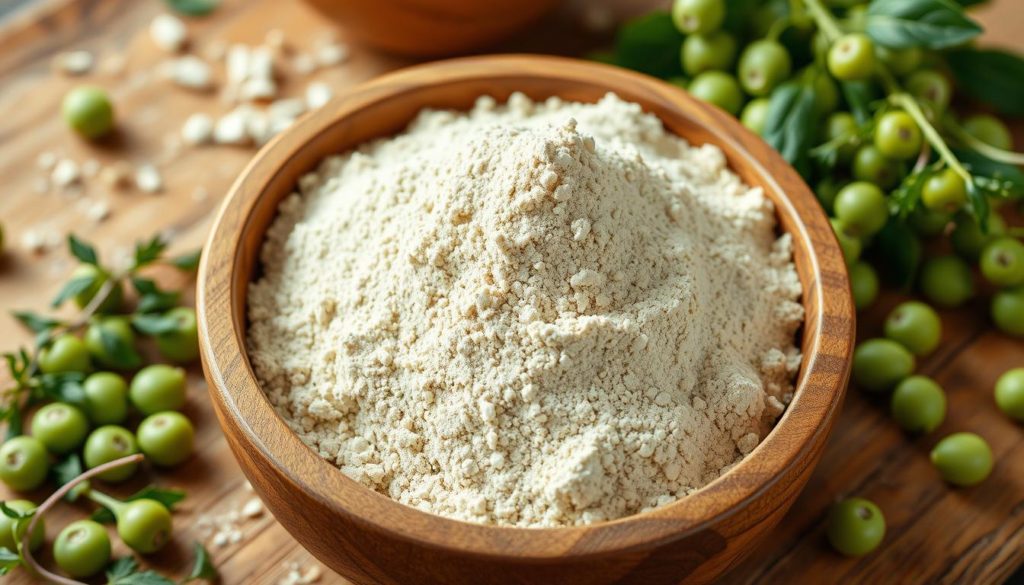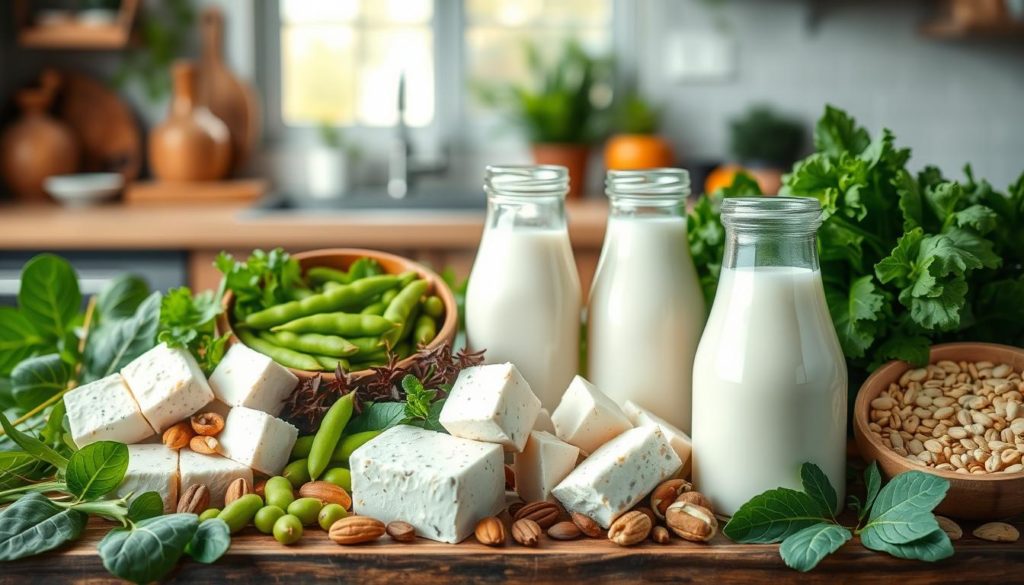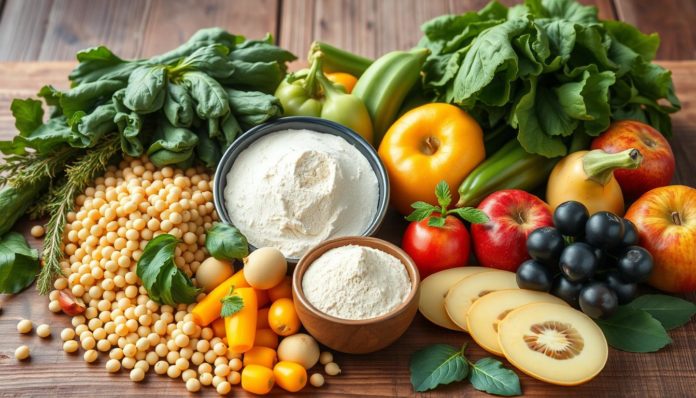Did you know that soy protein can reduce your LDL cholesterol by 3-4%? This fact shines light on one of the many health benefits of adding soy protein to your diet. More people are choosing a plant-based lifestyle, with soy protein being key for better health.
Soy protein is packed with benefits for a healthier life. It’s popular among athletes, vegetarians, and those who focus on their health. Whether you aim to up your protein or seek a greener diet, soy protein is your ally. It fulfills your nutrition demands while promoting a healthier lifestyle.
Soy protein boosts heart health and aids in bone strength. It may even help prevent cancer. This article will unveil how soy protein is vital for your health aims.
What is Soy Protein?
Soy protein is derived from soybeans. It stands out due to its nutritional benefits and versatility. This plant-based protein comes in several forms. These include soy protein isolate, concentrate, and textured soy protein.

It’s a complete protein source. Soy protein has all nine essential amino acids. Our bodies need these but can’t make them on their own. It’s particularly beneficial for vegetarians and vegans looking for quality nutrition.
The creation of this soybean-derived protein starts with soybeans. They are de-hulled and defatted first. Then, they are milled into soy flour. This flour is then processed further to extract the protein. This makes it usable in various dietary forms.
Soy protein boasts a rich nutritional profile. Not only protein, but it also offers vitamins, minerals, and dietary fiber. It can be added as a supplement or part of meals. This helps in enhancing health and wellness.
Knowing what soy protein is and its benefits is key. It helps in understanding its role in a balanced diet. Plus, it shows us how it fits into healthy lifestyles.
Health Benefits of Soy Protein
Soy protein is more than just versatile; it’s packed with health perks. It supports a heart-healthy diet, boosts bone density, and fights cancer. Let’s explore the ways soy protein can help you.

Heart Health
Heart-healthy benefits come with soy protein. It’s shown to cut down on “bad” cholesterol, LDL. Lowering LDL means better heart health and less disease risk. Isoflavones in soy also improve your arterial health, making your heart happier.
Bone Health
Soy protein also supports strong bone density. With nutrients like calcium and magnesium, it’s key for healthy bones. This helps in avoiding osteoporosis and keeping bones tough, contrasting bone loss. Soy’s isoflavones also promote bone growth.
Cancer Prevention
As a cancer-fighting food, soy protein has a role too. Its isoflavones may lessen breast and prostate cancer risks. They act as antioxidants, guarding cells, and stopping cancer growth. While we dig deeper into its benefits, adding soy to your diet is a wise choice for cancer prevention.
Types of Soy Protein
There are several types of soy protein you can choose from. They are soy protein isolate, soy protein concentrate, and textured soy protein. Understanding these options can guide your dietary decisions.
Soy Protein Isolate
Soy protein isolate is mainly protein with very little fat or carbs. It’s ideal for those seeking a lean protein source. In dietary supplements, it’s a common choice.
It boasts a protein content of over 90%. This makes it perfect for protein shakes, bars, and health foods.
Soy Protein Concentrate
Soy protein concentrate keeps more natural soy elements. It offers a good mix of protein and beneficial soy compounds. This soy protein variant is often found in food products and supplements. It’s known for its natural composition.
Textured Soy Protein
Textured soy protein is a hit among vegetarians and vegans. It mimics meat, making it ideal for many dishes. This includes tacos and spaghetti sauce.
It’s a key ingredient for those avoiding animal products. It offers a great way to get protein while sticking to a plant-based diet.
| Types of Soy Protein | Protein Content | Main Uses |
|---|---|---|
| Soy Protein Isolate | 90%+ | Protein shakes, bars, dietary supplements |
| Soy Protein Concentrate | 65-70% | Various food products, dietary supplements |
| Textured Soy Protein | 50-70% | Meat substitutes, vegetarian and vegan dishes |
How to Use Soy Protein in Your Diet
Adding soy protein to your plant-based diet is easy and flexible. You can mix it into shakes, use it in baking, or cook with it. This makes it simple to add to meals and snacks.
For morning smoothies, mixing soy protein powder with fruits, almond milk, and spinach is a great start. You can also add it to pancake batter to boost protein. Mixing it into oatmeal or yogurt gives you extra nutrition too.
Using soy protein in cooking is smart. Textured soy protein can replace meat in many recipes, like chili or stir-fries. Just soak it in vegetable broth, then use it as you would with meat. It’s perfect for those swapping animal proteins for plant-based ones.
If you’re eating plant-based, adding soy protein to snacks is smart. Soy protein bars are easy for a quick bite. You can make them at home to keep track of what’s in them and fit your diet.
Here’s a quick guide for using soy protein:
| Meal | Incorporation Method | Benefits |
|---|---|---|
| Breakfast | Smoothies, Oatmeal | Quick, easy, protein boost |
| Baking | Pancakes, Bread | Enhanced protein content |
| Cooking | Chili, Stir-fries | Meat substitute |
| Snacks | Protein Bars | Convenient, protein on-the-go |
By carefully adding soy protein to your meals and snacks, you boost your diet’s nutrition. This ensures you get enough protein-rich foods for your health.
Soy Protein vs. Other Plant-Based Proteins
Exploring alternative proteins, it’s crucial to look at soy alongside others. We will dive into pea protein, hemp protein, and rice protein. This comparison aims to help you make informed diet choices.
Pea Protein
Pea protein comes from yellow split peas. It’s famous for being easy to digest. This protein is full of branched-chain amino acids (BCAAs), great for muscle building and repair. Plus, it’s hypoallergenic, so most people can eat it without issues.
Hemp Protein
Hemp protein is made from hemp plant seeds. It stands out for its omega-3 and omega-6 fats. This protein is not only easy to digest but also has all nine essential amino acids. Its high fiber content is a bonus for your gut health.
Rice Protein
Rice protein, usually from brown rice, is a top pick among alternatives. It might not have all amino acids like soy or pea protein. But it’s easy to digest and hypoallergenic, perfect for those with food allergies.
For a clearer picture, here’s how these proteins stack up:
| Protein Type | Source | Complete Protein | Digestibility | Allergenic Potential | Key Nutrients |
|---|---|---|---|---|---|
| Soy Protein | Soybeans | Yes | High | Moderate | BCAAs, Isoflavones |
| Pea Protein | Yellow Split Peas | No | High | Low | BCAAs, Iron |
| Hemp Protein | Hemp Seeds | Yes | Moderate | Low | Omega-3s, Omega-6s |
| Rice Protein | Brown Rice | No | High | Low | Fiber, B Vitamins |
Popular Soy Protein Recipes
Adding soy protein into your meals is a fun journey with lots of choices. You can make smoothies, bars, and pancakes. All are great ways to use this flexible ingredient in your healthy diets.
Soy Protein Smoothies
Soy protein smoothies are a great way to kick off your day or pick yourself up after exercising. Just mix soy protein powder with fruits, some greens, and almond milk for a tasty and fulfilling drink. They help with muscle recovery and boost your health too.
Soy Protein Bars
For busy times, homemade soy protein bars are perfect. Mix soy protein powder with oats, nuts, dried fruits, and a bit of honey. Press it into a pan and cool it until it’s firm. These bars are full of good nutrients and make a fantastic snack.
Soy Protein Pancakes
Begin your day with soy protein pancakes for a breakfast full of protein. Add soy protein powder to your pancake mix with eggs, flour, and milk. Cook them as you would and top with fresh berries or maple syrup. They’re a tasty way to fuel your morning.
For more exciting soy protein recipes, visit this link. You’ll find a variety of dishes, like Vegetarian Tacos and Vegan Biscuits with Sausage Gravy. Trying these recipes can lead you to new, tasty, and wholesome meal ideas.
Best Soy Protein Products on the Market
Finding the best soy protein items can be tough, but we did the hard work for you. We have top recommendations for powders, snacks, and supplements that meet different needs. Check out our picks below for the best in each category.
Top Soy Protein Powders
Looking for a plant-based protein boost? Soy protein powders are a great choice. NOW Sports Soy Protein Isolate and Bob’s Red Mill are top brands that are known for quality. They have great taste and mix well in shakes or smoothies. These powders are praised for having low sugar and blending well with foods.
Best Soy Protein Snacks
Need a protein boost on the go? Soy protein snacks are perfect. KIND Bars and Seapoint Farms Dry Roasted Edamame are popular. They’re tasty and offer protein and fiber for energy. These snacks are great for staying energized and healthy while you’re busy.
High-Quality Soy Protein Supplements
Want more soy protein without changing your diet much? Soy protein supplements are a smart pick. GNC Pro Performance Soy and Naturade Total Soy are leading brands. They help with muscle recovery and overall health. These supplements also have vitamins and minerals for well-rounded nutrition.
Soy Protein for Vegetarians and Vegans
Choosing a vegetarian or vegan lifestyle makes some worry about getting enough protein. Soy protein is a great solution for those on plant-based diets. It helps keep your diet balanced and nutritious.
Nutritional Benefits
Soy protein is a top choice for vegetarians because of its nutrients. It has all nine essential amino acids, making it a complete protein. This is rare for plant-based foods. Soy is also full of vitamins, minerals, and isoflavones, which help with muscle repair and health.
Adding soy protein to a vegan meal plan boosts protein levels. This ensures you don’t miss out on important nutrients while staying true to your diet.
Meal Planning with Soy Protein
Meal planning is key for meeting vegetarian and vegan nutritional goals. By using soy protein, you can make your meals both healthy and tasty. It can be used in smoothies, oatmeal, or dishes like tofu stir-fries and burgers.
To learn how soy protein fits into a balanced diet, read this study. Adding soy to your meals means eating well and enjoying what you eat.
FAQ
What is soy protein?
Soy protein comes from soybeans. It is a complete protein. This means it has all essential amino acids your body needs. There are different forms like soy protein isolate, concentrate, and textured soy protein.
What are the benefits of consuming soy protein?
Soy protein is good for your heart. It lowers cholesterol. It also keeps bones strong and may lower cancer risks. Plus, it’s great for those who don’t eat meat.
How is soy protein isolate different from other types of soy protein?
Soy protein isolate has more protein. It has less carbs and fats than soy protein concentrate or textured soy protein. That’s why people who want lots of protein without extra calories like it.
Can soy protein help with weight management?
Yes, soy protein helps you manage weight. It’s high in protein but low in calories. It makes you feel full and keeps your muscles strong. Using soy protein is smart for controlling weight.
How can I incorporate soy protein into my diet?
You can use soy protein in many ways. Add it to shakes, baked goods, and meals. You can make smoothies, mix it with pancake batter, or make protein bars.
What are some popular soy protein recipes?
Popular recipes include smoothies, protein bars, and pancakes. These are tasty and healthy. They make adding soy protein to your day easy.
How does soy protein compare to other plant-based proteins?
Soy protein has all the amino acids you need. Other plant proteins like pea or rice might not. Soy protein also tastes neutral. This makes it good for many recipes and diets.
Are there any soy protein products you recommend?
Many soy protein products are great. Look for powders, snacks, and supplements. Brands like NOW Sports, Bob’s Red Mill, and Garden of Life are highly rated.
Is soy protein safe for vegetarians and vegans?
Absolutely! Soy protein is perfect for vegetarians and vegans. It offers important nutrients that can be hard to get from plants alone.
What are the nutritional benefits of soy protein for a vegan diet?
Soy protein has amino acids, iron, calcium, and more. It’s key for a vegan diet. It helps vegans get enough protein and supports good health.


